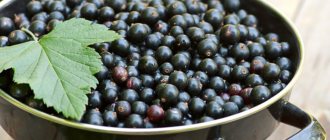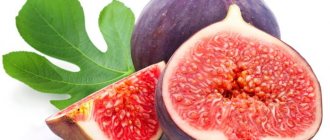When a baby appears in the family, every mother begins to think about nutrition. After all, the vitamins, minerals and nutrients that she consumes enter the child’s body. The diet should be varied, and preference should be given to plant foods. However, sometimes you have to refuse healthy products at first glance, because some of them may not have the best effect. It would seem that grapes are certainly healthy, but is this true? Let's find out whether grapes can be consumed while breastfeeding, as well as the rules for consumption.
No time to read? free list of allowed and prohibited foods during lactation
Beneficial features
The beneficial properties of grapes are determined by the fact that the berry contains 2.5-6% organic acids, which have a beneficial effect on human health. Grapes also contain 0.2-1.5% pectin components. Scientists have discovered various essential acids in grape berries:
- lysine;
- arginine;
- methionine;
- histidine;
- leucine
Grapes have many beneficial properties due to the high level of nutrients and antioxidants they contain.
The product also contains nonessential acids in the form of cystine and glycine. All these components actively affect metabolism, so it is very important that a person consumes berries in reasonable quantities. The dry mass of the berries contains about 60% potassium, which significantly improves the functioning of the heart and kidneys.
The berries also contain B vitamins and other beneficial substances. Regular consumption of grape berries helps normalize heart rate and blood pressure.
Due to the presence of expectorant components in the composition, the performance of the respiratory system improves and, as a result, sleep improves.
The berry has many benefits, so it is worth considering it as a way to improve your overall health.
Grapes and motherhood: the pros and cons of the product
Grapes are a juicy berry that is considered a tasty product for adults and children. So, the ingredient contains the following vitamins, organic acids, elements:
- silicon, boron, potassium;
- cobalt, iodine, copper;
- vitamins of group B (B1,6), K, P, A;
- vitamin C, H;
- folic and nicotinic acids, phytoncides, bioflavonoids, easily digestible sugar;
- antioxidants;
- amino acids – glycine, leucine, lysine, methionine.
Thanks to its unique composition, the product has the following positive properties:
- It is used to prevent the formation of malignant tumors in the mammary glands of women.
- Normalizes iron levels in the blood. Participates in the formation of carbohydrate and lipid metabolism.
- Normalizes water balance in the body, thereby preventing the formation of edema.
- Promotes improved functioning of the circulatory system.
- Reduces the risk of developing thyroid pathologies.
- Accelerates the process of producing the required amount of enzymes.
- Calms, normalizes sleep.
- Reduces the level of bad cholesterol in the blood.
- Normalizes blood pressure.
- Restores and strengthens the body's protective functions.
- Preventing the development of harmful microorganisms.
- Strengthens bone and muscle tissue.
- Improves metabolism, promotes natural collagen synthesis.
The chemical composition of grapes is similar in composition to breast milk. All the useful components contained in the berries make it possible to compensate for the lack of essential substances and vitamins in the body of the baby and mother.
Tips for choosing grapes
When you come to the market, you can see a large number of different grape varieties, among which it is sometimes difficult to choose the most suitable one. Black, white, pink, red grapes look very beautiful, but in order to choose not only sweet, but also ripe grapes, you need to know a few nuances:
- First of all, you should understand that high-quality grapes do not fall off the bunches, and the berries do not have various damages and strange spots.
- It is also worth paying attention to the brush. The berries should not be wet or moistened, and the stem should retain its natural green color and not have a dry tip or various spots.
- If the grapes are fresh, then they have a specific coating on them. The absence of a prune (waxy) coating indicates that the grapes are several days old and were stored incorrectly.
- There is also a secret that allows you to choose the most delicious and ripe grapes. The most unripe berries are always at the bottom of the bunch, so when choosing each bunch, it is advisable to try one of the lowest grapes.
It is quite easy to choose beautiful and tasty grapes, but a large and maximally colored product will not always be sweet, so it is worth paying great attention not only to external factors, but also to taste.
How to choose grapes?
There are useful and practical tips that will help you purchase a product with good taste and quality characteristics:
- Choose a bunch with firm berries without obvious damage or dents. But a white coating is normal; it is a natural wax that indicates the ripening of the grapes. There is no need to be afraid of wax formations on the berries.
- The presence of brown spots on the berries is also not a cause for concern.
- The berries should not separate too easily from the bunch or fall off it. This is a clear sign that the grapes are overripe. You should purchase a bunch on which the berries are firmly attached.
- Pay special attention to the branches in the bunch; if they fit tightly, the berries may rot; it will not be possible to preserve this bunch for a long time.
- The main qualitative characteristic of berries is the weight of the product. For grapes growing in greenhouse conditions, the minimum weight is 350 grams; for grapes grown in a garden, this figure is less - 150 grams.
- The “Isabella” grape variety is considered questionable because the berry contains harmful methanol compounds. This variety is legally prohibited in Europe and America. Of course, you shouldn’t stop eating these grapes because of this – use extreme caution!
- The ideal place to store grapes is the refrigerator. In a wooden container or on a board. These storage conditions allow you to preserve the berries for 21 days.
Is it possible to have grapes during breastfeeding? Each nurse makes her own decision. The substances contained in the berry are indispensable during the recovery stage after childbirth. But due to their individual characteristics, you should eat grapes no earlier than three months after giving birth.
Start with white or green varieties of berries, strictly adhere to the recommended dosage. Follow the given rules, tips, recommendations.
High glucose content
Like any product, it is important to consume grapes correctly. 1 kilogram contains about 300 grams of various sugars. Depending on the ripening period and ripeness of the bunch itself, the following may predominate in the berry:
- fructose;
- glucose.
Sugary substances such as glucose and fructose have minimal sweetness in taste compared to sugar, but at the same time they are a necessary product for the human body. When fully ripe, grapes contain fructose and glucose in almost equal proportions.
If the brush was immature, then it contains more glucose. Fructose predominates in overripe berries, so they are more sweet and sometimes even cloying in taste.
Contrary to popular belief that grapes are a rather harmful product due to the increased amount of sugars, their benefits have been proven by many scientists. Grapes have a beneficial effect on the body in reasonable doses and can completely improve its performance.
When breastfeeding a newborn, grapes also promote milk production, so a young mother should not give up her favorite product when feeding her baby. Despite its benefits, you should not get too carried away with grape bunches, as excessive consumption can be harmful to health.
Glucose is one of the most common sources of energy in the body. It is found in the juice of many fruits and berries, including grapes, which is where the name comes from - grape sugar
Raisin
“Grapes” in Turkish is “Raisin”, but for us it is the name of dried berries. Raisins, like grapes, come in different varieties. Just like for berries, in the case of raisins the rule is true - dark berries have a greater positive effect than light relatives. Raisins are essentially sweet, but the sugar contained in the product is fundamentally different from the usual sand.
Dried berries contain fructose and glucose - healthy carbohydrates that do not lead to an increase in insulin levels in the body. This product has a positive effect on the functioning of the heart, vascular system, and strengthens the immune and nervous systems.
Like fresh berries, sweetness can lead to colic and other negative symptoms in infants. Use the product with caution; do not eat raisins in combination with baked goods.
When purchasing a product, choose natural raisins that have not been exposed to chemicals. Immediately before eating the product, it must be washed thoroughly, pour boiling water over it, and let it settle. It is allowed to use raisins in the preparation of simple desserts.
Can a nursing mother eat green grapes?
Many young mothers are afraid that their child will develop various allergic reactions in the form of a rash or a tummy ache. It is very important after the birth of the baby to follow a certain diet that will prevent stomach problems and also protect the baby from rashes.
Grapes are a rather controversial product, as they are not allergenic, but due to the increased sugar content, a child may have stomach problems.
You should not take risks and introduce the product immediately after the birth of the child. The optimal solution would be at the age of 2 months - at this time the baby’s stool normalizes, thanks to which the child is more likely to cope with a new product in the mother’s diet.
If there is an excessive desire, then you can try to introduce the product per month, but you should be very careful about changes in the baby’s condition. Green grapes are usually the most hypoallergenic, so you can try them.
Next, you can introduce black and red grapes - if there is no reaction to green grapes during breastfeeding, then with a high probability other varieties of berries will not cause negative reactions.
Green grapes for breastfeeding are possible if the baby has problems with stool - constipation
Despite the mother's choice of grapes, it is worth adhering to certain standards when breastfeeding, since overeating sweet foods can cause a rash in the baby. Do not exceed the recommended limits, which differ depending on the grape variety and its sweetness.
It is best to introduce grapes gradually, starting with just a couple of berries and working up to normal levels over the course of a week.
It is worth considering that it is better to introduce grapes as a separate meal, as they are not compatible with all foods. Grape berries should not be combined with:
- dairy products;
- bread;
- mineral water;
- meat.
All these products in combination with grape berries can lead to intestinal upset in both mother and child.
Harm
But it is necessary to take into account that a nursing mother can eat grapes, but its inclusion in the diet after pregnancy can lead to negative consequences for the child. Provoke disruption of the normal functioning of the digestive organs, up to dysbacteriosis.
The main danger is the likelihood of an allergic reaction, especially at the initial stage of lactation.
During the first three months, the infant’s still unformed body (organs of the digestive system, enzyme glands) reacts particularly sharply to food products that can cause allergies.
Thus, the inclusion of sweet berries in the menu of a nursing mother can cause intestinal disorders, excessive gas formation, and intestinal colic in infants. Keep in mind that most of the product is sugar; consuming it in excess will inevitably lead to weight gain.
A young mother knows about the characteristics of her body, the food that can lead to negative consequences, but for the baby this still needs to be determined.
Do a simple test for an allergic reaction in a newborn:
- eat one or two grapes, wait a day;
- in the absence of negative symptoms or an allergic reaction per day, eat three to five grapes, wait a day;
- if there is no allergic reaction and no negative symptoms, you can eat grapes, gradually increasing the amount of product, even while breastfeeding.
According to the authoritative pediatrician Komarovsky, this fruit is not recommended for consumption by the following categories of people:
- for diabetes mellitus;
- with the problem of excess weight;
- with pathologies of the functioning of the digestive system;
- in case of violation of the frequency and fractional composition of stool (absolutely not during diarrhea);
- with exacerbation of a stomach ulcer.
A nursing mother can eat grapes, but to avoid allergic reactions and negative symptoms, you must strictly adhere to the rules given below. This way you can enjoy the fruit without harming the mother and baby.
Recipes for dietary dishes with grapes
There are many original dishes, but not all of them are possible while breastfeeding. One of the dietary recipes that you can use while breastfeeding is chicken breast salad with grapes. It includes:
- 150 g boiled chicken breast;
- 100 grams of hard cheese;
- 150 grams of grapes (preferably the raisin variety);
- 1 teaspoon Dijon mustard;
- 1 coffee spoon of honey;
- 1 tablespoon lemon juice;
- 2-3 tablespoons of sour cream;
- greens, salt, pepper to taste.
It is worth considering that if a child is allergic to honey, it is better not to use it when preparing a salad. You can also omit mustard if there is incompatibility.
The salad is prepared quite quickly, so its preparation will not be difficult even for a very busy mother. The chicken breast must be cut into small pieces, the cheese grated on a coarse grater, and the grapes cut into halves. Next you need to add mustard, honey and lemon juice.
Next, you need to add salt, pepper and herbs to taste and pour sour cream over the salad. After adding all the ingredients, the salad must be mixed again.
There is also an easier salad recipe suitable for pregnant women. Includes:
- 200 grams of soft cheese without salt;
- 200 grams of dark grapes;
- a bunch of any lettuce;
- 1 tablespoon freshly squeezed lemon juice;
- 40-60 grams of walnuts;
- 1 tablespoon olive oil;
- 2 tablespoons of honey.
If necessary, you can remove honey from the recipe. The cooking process involves laying out a bed of lettuce. Next, you need to cut the cheese into cubes and place them on the leaves. Mozzarella is best suited for salad.
At the next stage, pre-washed grapes need to be cut in half and placed on top of the cheese. Next, you will need to prepare the dressing - to do this, mix nuts, honey, lemon juice and olive oil in a blender and grind until a homogeneous sauce is formed. The finished sauce is poured over cheese and grapes on a bed of lettuce.
Grapes during breastfeeding: benefits and harms
Grapes are a nutritious berry, because their calorie content is one of the highest among berries. Black varieties are the most nutritious - 96 kcal per 100 grams of product. They contain vitamins A, B6, C, as well as potassium, iron, zinc, magnesium, manganese, phosphorus. This helps stimulate metabolism, increase the tone of the heart muscle and increase cerebral circulation. There is an opinion that it can have a positive effect on visual acuity and immunity. Many mothers and children (especially those born in the winter) have low hemoglobin, grapes, or rather the substances that are present in it, will help cope with this. Despite the benefits of consumption, there is one contradictory effect of this berry: it causes fermentation and gas formation.
The calorie content of grapes is 96 kcal per 100 grams.
Benefits of grapes
There is an opinion that eating grapes during breastfeeding helps improve lactation and strengthens the immune system. As mentioned earlier, the benefits of this berry even during breastfeeding are obvious. Of course, everything depends on the individual characteristics of your body. Often a young mother experiences a loss of strength or, conversely, insomnia. Grapes will help here. It contains glucose, so young mothers often answer positively to the question whether a nursing mother can eat grapes.
Grapes are an excellent natural remedy for restoring strength.
Possible harm from eating grapes
In the first months, the baby is often bothered by pain in the tummy. Some mothers begin to use medications, while others begin to control their diet. One of the foods that can cause increased gas formation and bloating is grapes, as it causes fermentation in the child’s body. This berry also contains a so-called allergen. And this may also be one of the reasons for refusing to eat grapes while breastfeeding.
Grapes are a fairly allergenic product that can cause increased gas formation.
Allergy risk
Another negative consequence is an allergic rash. Usually, rashes appear within 24 hours after consuming an unwanted product, but in some cases the reaction can last up to three days.
Food allergies in infants
Usually, when you stop using the product, the rash can go away on its own, so if grapes are not suitable as a food product for a nursing mother, then by eliminating them from the diet, you can notice a gradual disappearance of the rash.
It is worth noting that the child’s gastrointestinal tract gradually adapts to new products, so even if there is a negative reaction at the first attempt, you can try to reintroduce the product after a month.
Is it possible to give it to a child?
Most children's doctors recommend giving fresh grapes to children at 2 years of age. Some pediatricians recommend delaying first use until age 3 to reduce the likelihood of negative reactions.
It is allowed to add berries to dishes (various casseroles, puddings, soufflés, etc.) from 1 year of age. At the same age, the child is first offered diluted grape juice or compote, but only if he does not have allergies.
How to eat properly during lactation
So is it possible to eat grapes or not while breastfeeding? Experts believe that in the first 3 months of breastfeeding you should not experiment with the gastrointestinal tract of the newborn baby. Therefore, during this time period, it is worth completely eliminating the product from the diet.
To obtain maximum benefits, you need to pay attention to the following rules for consuming grapes during lactation:
- You can add grapes to a nursing mother’s diet when the baby turns 3, or preferably 6 months.
- For the first time, it is recommended to prepare compote from berries (diluted juice in equal proportions) and drink no more than 200 ml per day or consume 3 to 4 berries, but no more. Therefore, at first it is strictly forbidden to eat a lot of grapes.
- It is necessary to increase the consumption rate slowly. You are allowed to eat 100 grams of fresh fruits per day, and up to 200 grams per week.
- The berries must be clean.
- It is recommended to take the juice in the morning after breakfast.
- It is forbidden to eat berries in combination with other foods.
After the first use of grapes for 2 days, it is necessary to monitor the child’s reaction. During this period, it is strictly prohibited to introduce new food products. If an allergic reaction does not appear, then you can add the ingredient to the diet, but not more than 2 times every 7 days.
Grapes and woman's milk during breastfeeding are compatible, but only if used correctly. Berry fruits have a beneficial effect on the quality and production of milk.
Negative effects of grapes during the lactation period
Despite the fact that grapes are endowed with so many beneficial properties, you should eat them in limited quantities during breastfeeding. It can cause various health problems for the newborn and his mother.
It is worth noting that grapes are a strong allergen, so women during lactation should use them with caution. Allergies in a child can manifest themselves in the form of rashes on the skin, and in more severe cases, attacks of suffocation and anaphylactic shock can occur.
Another significant disadvantage of grape fruits is that they contain a large amount of sugar. It promotes increased gas formation and fermentation in both women and babies.
If a child often suffers from colic, then grapes must be completely excluded from the diet. Excessive consumption of sweets, especially in the first three months after the birth of a baby, can provoke intestinal colic and cause gastrointestinal disorders. The baby will suffer from constipation or diarrhea.
Also, a nursing mother should not eat grapes if she or her newborn is overweight.
The acid contained in the berry causes destruction of tooth enamel, so after each use you need to brush your teeth or rinse your mouth thoroughly with ordinary water.











